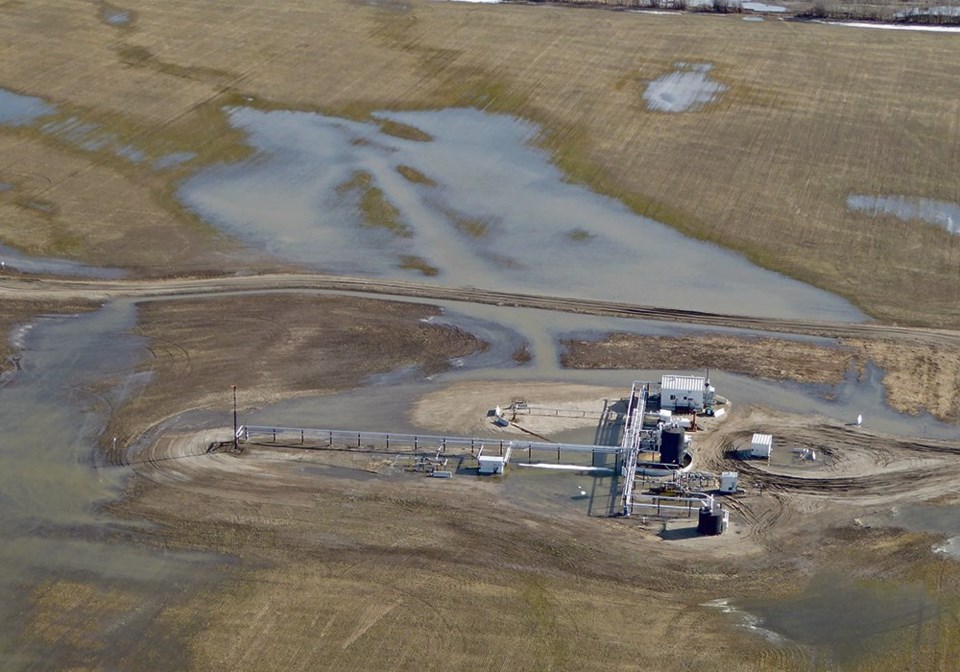However, a growing number of producers say the scales have tipped against them after the last oil and gas boom busted, leaving behind unkempt and unpaid for infrastructure.
Alberta energy minister Sonya Savage acknowledged the issue in October.
“It’s absolutely unacceptable if and when oil and gas companies aren’t paying the full lease payment to farmers,” said Savage. “These oil and gas companies need to pay the surface rights holders in full.”
Savage said the Alberta government is taking steps to look at the legislation in how oil and gas companies are dealing with outstanding issues.
“It’s a problem. I’m aware of it. We’re addressing it,” she said.
Glen Goertzen farms in Alberta’s Peace region, as well as near Stettler, and said there are companies that live up to their obligations to farmers and ranchers who host infrastructure on their land.
“But some companies, once the lease is signed, all the other parts of the contract that have to do with looking after the lease and controlling the weeds are ignored,” he said.
The situation has led Goertzen to file complaints with Alberta’s Surface Rights Board.
“The Surface Rights Board used to go to the site and you would have a very simple solution — they would just tell the oil and gas company to clean it up and it would be over and done with,” he said. “But the Surface Rights Board won’t go to the site anymore.”
Goertzen said that issue has increasingly led to producers having to go to a hearing process.
That can mean hiring a lawyer or consultant, which can prove costly with no guarantee of success.
“It’s just a pig in a poke as to what you are going to get,” said Goertzen of the Surface Rights Board process. “I have been there three times, I’ve read quite a few decisions and know quite a few people and there seems to be no real rhyme nor reason to the adjudication.”
For Kelly Bradford, who farms in the Rural Municipality of Miry Creek in southwestern Saskatchewan, the process in his province has left him exasperated after having to deal with the fallout of a bankrupt natural gas company’s deteriorating infrastructure.
That includes having to deal with a leaking pipeline and pushing for a quick fix to the problem.
“At harvest time you’re combining, the wells there are a nuisance. If you’re not going to get any compensation for them, they might as well clean them up and get them out of there,” said Bradford.
But that’s a situation easier said than done with a company in creditor protection and whatever funds that might be available tied up in the process.
Meanwhile, well sites continue to become weed collectors, spreading seeds across fields and adding costs to producers for herbicides.
“One hundred percent of this problem falls on the provincial government,” said Bradford. “That’s where the problem lies — it’s in the provincial regulations that allow this to even happen.”
In a statement, the Saskatchewan government said it regularly inspects, tracks and enforces non-compliance at sites and landowners can contact Energy and Resources field offices with concerns.
It also says a new program being introduced in Saskatchewan will require companies to clean up a prescribed percentage of their inactive infrastructure on an annual basis.
“Landowners also have the option to pursue collection of unpaid rentals through the court system and reduction of surface lease rentals can be disputed through the Surface Rights Board of Arbitration,” read the statement.
The Canadian Association of Petroleum Producers (CAPP), which advocates for the industry, said in a statement that companies are struggling to recover from the recent downturn. But a vast majority of oil and gas companies maintain their infrastructure.
A statement by Jay Averill, CAPP spokesperson, said CAPP is working on the issues with municipalities and the Alberta government.
Paul McLauchlin, president of Rural Municipalities of Alberta, said he has heard about the problems of weed control and others relating to oil and gas infrastructure.
“If you’re not taking care of your business, which is the weeds on the surface, that’s not fair and that’s not right,” he said.
Part of the issue in Alberta is that agreements between landholders and companies aren’t filed with the province or the Alberta Energy Regulator (AER) and that can sometimes lead to contracts getting lost over time through corporate takeovers or changes in land ownership.
“If you ask a company, ‘can I see my agreement,’ they typically don’t have them,” said McLauchlin. “There are agreements on the landscape between landowners and industry — the AER has nothing to do with those agreements and it’s the wild west out there.”
McLauchlin said there are good companies living up to their contractual obligations, but the scope of the issue is a mystery, he added, even in his home municipality of Ponoka County.
“I don’t know how many complaints that the AER gets on weeds in Ponoka County. I don’t know how many orphan wells are in Ponoka County. I don’t know what the environmental liability is in Ponoka County,” said McLauchlin. “And I’m the reeve of Ponoka County.”
According to a 2021 University of Calgary report, in Alberta there are 97,000 inactive wells that require proper shutting in and 71,000 abandoned wells that have yet to be reclaimed.
The report estimates more than 50 percent of Alberta’s oil and gas wells have been inactive for more than five years and nearly 30 percent have been inactive for more than a decade.

